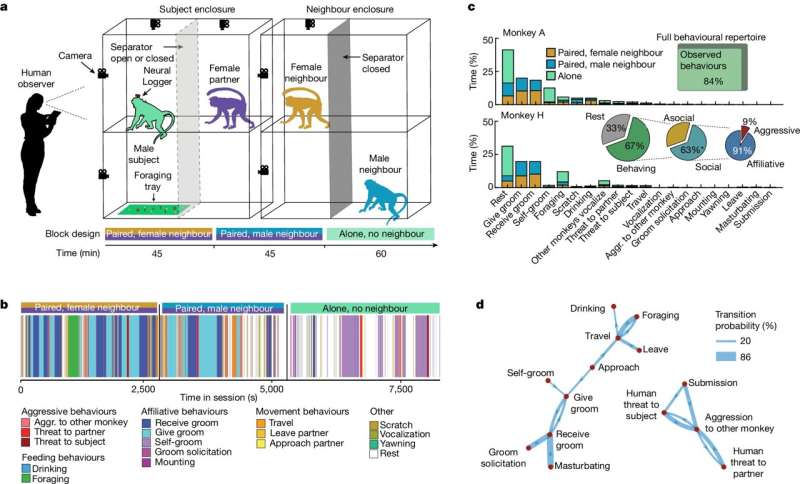March 15, 2024 report
This article has been reviewed according to Science X's editorial process and policies. Editors have highlighted the following attributes while ensuring the content's credibility:
fact-checked
peer-reviewed publication
trusted source
proofread
How social behavior is encoded in the monkey brain during everyday tasks

A team of neuroscientists at the University of Pennsylvania has, for the first time, observed how social behavior is encoded in the brain when monkeys are doing normal, everyday things rather than sitting in a laboratory setting.
In their study, published in the journal Nature, the group affixed brain monitoring devices to adult male macaques as they went about their normal business.
As the researchers in this new effort note, most of the research involved in studying brain function is conducted in sterile lab environments. So it is not known what differences there might be when humans or animals are simply going about their normal day-to-day activities.
To find out whether there are differences and to learn something about their nature, the researchers conducted experiments with adult male lab macaques as they went about their business under three scenarios: when alone, when with interacting with another male, and when interacting with a well-established female partner.
Four adult rhesus macaques were involved in the experiments, though only the males were fitted with neural recording devices. Prior to the experiments, both of the males were fitted with neural implants. At the outset of each experiment, the male to be tested was fitted with a device that recorded neural activity in the prefrontal and temporal cortex lobes. Each interactive experiment lasted for approximately 2.5 hours.
The research team identified 24 specific behavioral patterns along with social contexts. Further analysis showed a nearly perfect reciprocity in males and females during grooming. The researchers also found that when the male being recorded was confronted with an aggressive intruder, its behavioral and neural responses showed some degree of empathy, which could be buffered by the presence of a friendly female partner.
The team suggests their experiments demonstrate highly distributed neurological responses to a wide variety of everyday activities, and that similar patterns likely occur in the human brain.
More information: Camille Testard et al, Neural signatures of natural behaviour in socializing macaques, Nature (2024). DOI: 10.1038/s41586-024-07178-6
© 2024 Science X Network




















